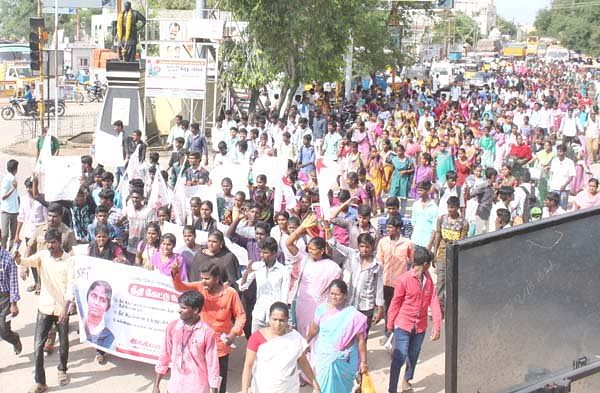It is no surprise then that Tamil Nadu, which has a century-long tradition of social justice, was at the forefront of opposing NEET.
Anitha, a young Dalit teenager from Kuzhumur village, Ariyalur district, committed suicide on 1 September because she could not secure a medical seat after the imposition of NEET as the main criterion for medical college admissions.
But she sought exemption from National Eligibility and Entrance Test (NEET) in the Supreme Court, not on the basis of her socio-economic background — she lost her mother ten years ago and her father works as a daily-wage load worker — but on the basis of merit. She had scored 1176 marks out of 1200 in her Class 12, and a 196.75 cut-off mark under the counselling method, which should have guaranteed a seat in all the top medical institutes in the state. But she didn’t get admission into an MBBS course due to poor scores in NEET.
Arguments about merit are often used as a political weapon to control, suppress and degrade people from underprivileged sections of society. The stand by the government and the Supreme Court stifled a young genius like Anitha.
In a state whose political legacy of identity politics is steeped in Tamil sub-nationalism, reservations, assertion of state autonomy and resisting imposition of Hindi language, this suicide resonates widely. The late chief minister M. G. Ramachandran was strongly opposed to the interference of the Centre in matters related to education and health. Former chief minister J. Jayalalitha had opposed NEET.
The imposition of NEET as a single elimination process in the country with its vast diversity is absurd, violates states’ autonomy and the principles of reasonable decentralization.
Does NEET uphold merit? Does NEET stand for fairness and equity? Is it the push for homogenization?
Tamil Nadu has one of the best public health care and medical education systems in India and has 23 medical colleges. Without NEET, which is conducted by the CBSE, the state has produced thousands of talented doctors from modest backgrounds. The admission to MBBS seats in the state government counselling is fairly accessible to students from downtrodden sections. NEET will prevent a number of underprivileged students from securing admission in medical education. Only the rich elites, who can spend lakhs of rupees at coaching centres, can now corner these seats.
It is no surprise then that Tamil Nadu, which has a century-long tradition of social justice, is at the forefront of opposing NEET. There is no study to establish that Tamil Nadu has become relatively inefficient because of its counselling-based medical admissions. On the contrary, Tamil Nadu is a leader in healthcare. You can run into thousands of great physicians, surgeons and experts in every discipline of medicine who have obtained medical degrees right after finishing +2, without NEET.
The demise of the dynamic J. Jayalalithaa resulted in political chaos as the ruling party AIADMK broke up into different factions, making them politically inept at safeguarding the state’s autonomy. Hence, the state government put up a weak fight in the apex court, seeking exemptions only for the seats of the government colleges and government quota.
The Parliamentary Committee on NEET had observed that an exemption for states that do not wish to come under NEET should be allowed. This was a solid ground for the apex court to reject the prayer of Nalini Chidambram for NEET-based admissions. The least the apex court could have done is to have exempted Anitha as an impleader in the Tamil Nadu case.
Some people have asked how a person who commits suicide can be considered a rebel. Others asked if she was weak-willed. She definitely wasn’t.
R. Vijayasankar, the editor of Frontline, recently wrote in a Facebook post: “No separate room in her house; no air-conditioner or even fan; she has no cell phone; she has no qualified and affluent mother nor father who avail ten days leave to stay with and help her; besides her no flask with coffee /tea while doing overnight study; no grandpa saying ‘those days we were in government service, you know’; She has no uncle who works in American IT company earning dollars and comes once in a year with a Ray ban sunglass; she cannot offer for Rs. 500/- or 1000/- per hour based tuition teacher; no weekend cinema or restaurant; No place to go for a holiday; despite that she secures 1176 (of 1200 in +2) This is actual merit!!”
Anitha resorted to the extreme step only after exploring all possibilities for justice. She had come up through the system despite her struggle with an extremely poor socio-economic background, and her scholarship and performance came against all odds.
The author is Associate Professor, Madras Institute of Development Studies, Chennai.
